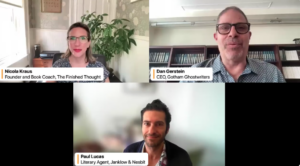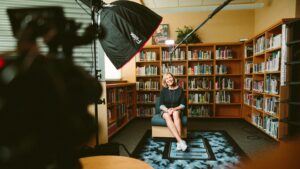On the heels of plagiarism allegations against a prominent author and his ghostwriter, we asked the members of our writer community for their experiences and insights regarding attribution. Everyone agreed that plagiarism is unacceptable, but many noted the manifold ways that misattributions and errors can creep into a draft in progress. Whether through a client’s faulty memory or mixups in TrackChanges, a good collaborator needs to be on guard against simple mistakes that can lead to major consequences.
No question about this — whoever does the research/writing should footnote every single statement or piece of information taken from someone else’s work. It’s tedious work, but absolutely necessary. And it should be explicitly stated as a term of the collaboration.
–Vanda Krefft
First and foremost, plagiarism is never never never acceptable. It undermines credibility. And it’s theft, pure and simple.
As for policing it, it’s not all that hard. My son taught at a college in Wisconsin, and whenever he tripped on a phrase that sounded a tad too sophisticated for a student, he popped it into Google and — well, you know the rest. Granted, a professional writer is a bit harder to detect in this way, but still. The named author bears some responsibility, just as a newspaper editor bears some responsibility for a reporter who commits larceny or misspells a prominent person’s name or gets a story wrong.
–Bryan Gruley
Attorney and long-time editor here. There is no excuse for plagiarism. None. No one working in writing or editing can pretend not to know that using someone else’s work without accurate attribution at the very least is unacceptable. I knew that much when I was in grade school.
Yes, it’s possible to lose one’s notes on sources, but then you retrace steps and recreate them. You don’t figure, “oh gee, I lost my notes so I guess I’ll just use this without them.” It’s also possible to misuse a phrase or two without meaning to, but not more than that.
–Mary E. Cadette
Should authors be expected to fact-check their collaborator’s work? Should using a plagiarism checker be part of the contract?
Authors and ghostwriters should fact-check each other. As a writer I’ve caught mistakes made by nearly every author I’ve ever worked with. These weren’t out of laziness or any mal intent, but because the stories and narratives we work with are complicated with multiple variables of time, location, memory, source, and on and on. So, it is impossible for either an author or a ghostwriter to be perfect or to equally understand all aspects of the story that may have particular risk of an error of fact or lack of citation.
It’s also important to note that significant mistakes can accidentally be edited into a manuscript. If an editor deletes the end of a sentence, for example, or a large block of text or in some other way removes a subscript for a footnote or endnote, that’s a problem that an experienced ghostwriter should anticipate. Part of the solution is for ghostwriters to play a real role in the revision of the manuscript after it’s been edited. This adds another layer of work but one that could save the ghostwriter professionally.
It is also incumbent upon ghostwriters to organize their work in a manner so that uncredited text cannot find its way into their work. We all make mistakes, but perhaps one mistake we can avoid is not properly organizing research and any text that we are unsure if we or the author wrote it and it is original. Without a proper process, it’s too easy to mix up text lines from interviews, other books, submitted by the author, copied and pasted from an online source, and so on. And we must also make sure that if in doubt, we slug a footnote or endnote to a line of text. This is so much easier than the alternative.
If it’s plagiarism software, I don’t believe it should be in the contract. Much of this software is imperfect and could too easily miss something. But yes to a fact and plagiarism check by a human who could use software as part of their process but not the entirety of their process. This is especially true for work requiring multiple interviews and significant research.
Ultimately, though, the ghostwriter should be the backstop for the author. We own this function whether we want it or not. At the same time, an author will put their name on the finished product, so they must also read with a keen eye the material and collaborate with the author to minimize the risk of plagiarism or issues of fact.
–James Buchanan
How much fact-checking should we do for ghostwriting/coauthoring?
This is a question I’ve been trying to get answered since I first started coauthoring/ghostwriting four years ago. After nearly 30 years in journalism it’s ingrained in me to factcheck everything but when it comes to people’s memories, how do we do that?
The way I handle it is I look for public records to help with aiding the memory and, most importantly, have detailed endnotes that cite all of the sources I’ve used for each chapter (for my book Chasing Cosby my endnotes were more than 20 pages.) I also had endnotes for my second book, Victim F, and when my clients cited their account of something that had happened that involved other people I asked them to fact-check with the people who were in the scenes to make sure their memories were the same. We also checked against transcripts and public documents.
When it’s a memoir it’s more difficult but there are things that are checkable — with one I did the woman had tried to commit suicide but had the years mixed up so she went back through her medical records and nailed down the exact date, which was two years earlier than she had recalled.
While I don’t think it’s the author’s responsibility to fact-check their coauthors/ghostwriters (we’re the professional writers, not them) I do think hiring a fact-checker at the end of the process is essential for any book project, especially when you’re writing narrative non-fiction which usually involves a lot of interviews and documents and other sources, and it would also turn up any potential plagiarism issues.
–Nicole Weisensee Egan
I’ve been caught up in a plagiarism situation twice, and in both cases, it was in the material provided to me by my client that they presented as their IP. I had no reason to suspect that it wasn’t.
In the first case, the publisher of a competing book sent the publisher of my client’s book a letter notifying them of the plagiarized material. When our publisher reached out to me, I double checked, and there was a ton of material lifted right out of the competing book. Instead of having us rewrite the book, the publisher pulled it from sale and destroyed all copies. This one really blew my mind
In the second case, someone flagged a paragraph in my client’s recently published book as someone else’s work. I did an internet search to double check, and sure enough, it was someone else’s work. That led me to be concerned there could be more, so I ran the complete original manuscript through an online plagiarism checker and found more. I rewrote all the passages and submitted to the publisher for correction in the ebook and future printings.
Again, in both cases, I had no reason to suspect that the material they provided to me wasn’t theirs.
I think it’s smart business for the ghost/author team to run their manuscripts through a plagiarism checker — before it’s submitted to the publisher, not after. That would prevent a lot of problems down the line, and result in a much better outcome for everyone.



